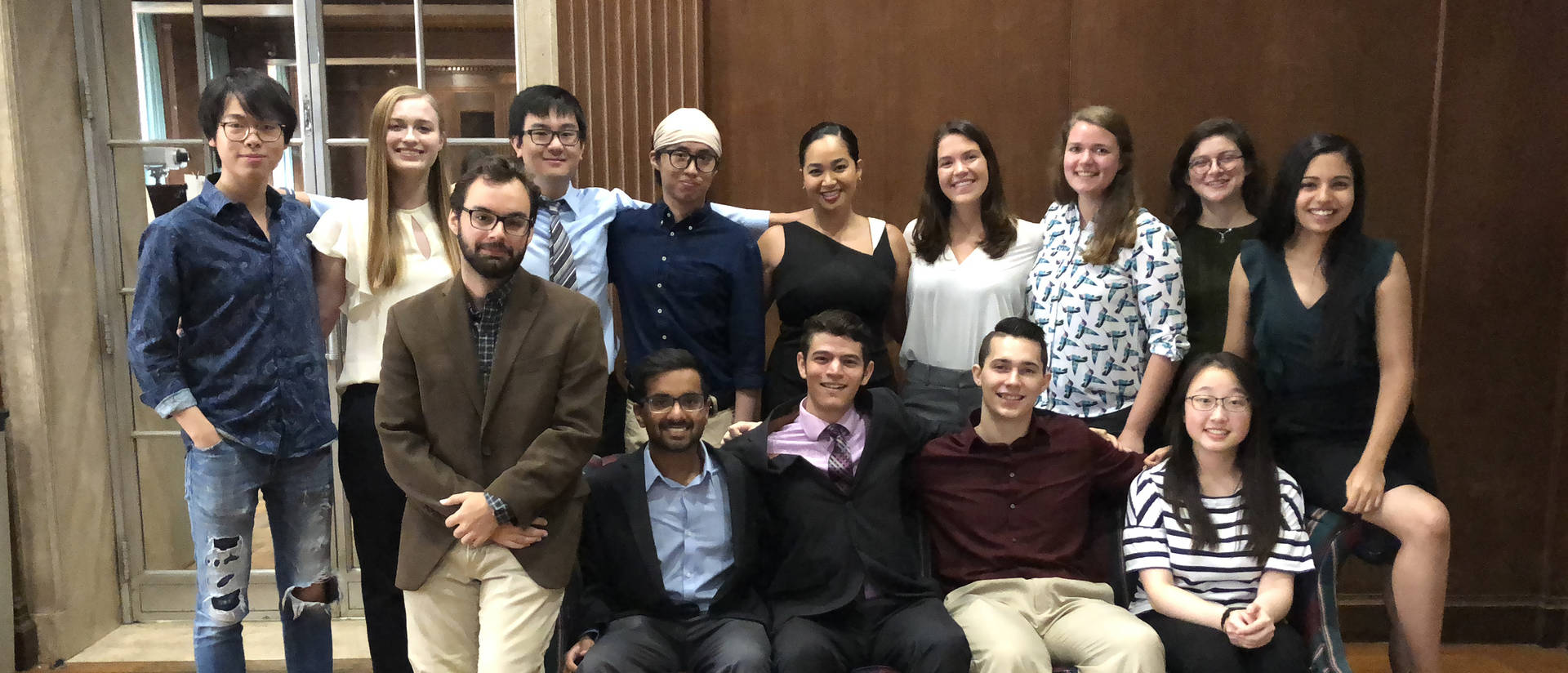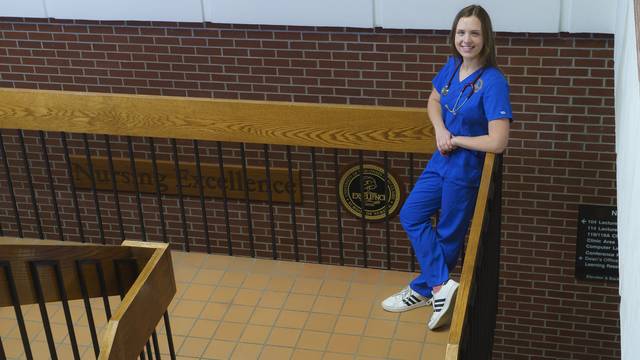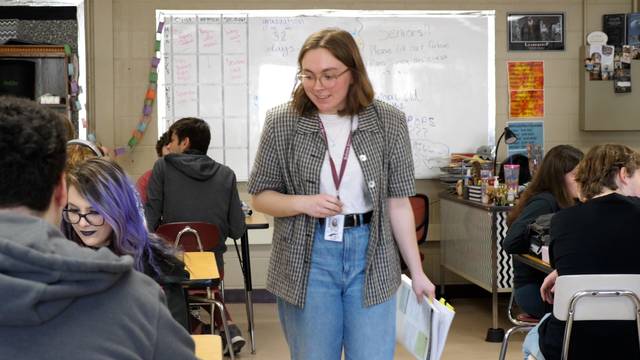Dawn Paukner is no ordinary Honors student. Her complicated and intriguing journey reveals a unique pattern of interests that models Eau Claire’s dedication to liberal education and will lead her to cutting-edge research opportunities in the future.
When considering college options, Dawn prioritized “the opportunities that exist beyond the standard.” She was searching for a college that would adequately prepare her for medical school or graduate school while enabling her to pursue undergraduate research along the way. The University of Wisconsin-Eau Claire fit perfectly.
In addition to her academic interests, Dawn has a notable family history with both the university and the Honors Program. Her two older brothers attended, completed the Honors Program, and graduated with degrees in mathematics. She, too, is following this pattern; Dawn will graduate this spring with Honors and a major in Applied Mathematics. However, with a minor in neuroscience, Dawn is far from following in their footsteps and has already forged a unique path for herself.
One of Dawn’s initial experiences with Honors turned out to be fundamental to shaping this future career path. During Spring of 2016, she decided to attend a Meals with Honors lecture by Dr. Carolyn Otto. The Meals with Honors program allows professors to give lectures on a topic of choice – usually a research area or specialty.
Dr. Otto’s focus is Knot Theory, a branch of mathematics, and its applications to the field of biology. During the meal, Dr. Otto mentioned that she had several research positions open. Intrigued, Dawn reached out via email, and they set up a meeting for the next week. After a brief chat, Dr. Otto offered her a research position on the spot starting in the fall.
At the same time, Dawn was pursuing another research project in psychology as part of her Blugold Fellowship. The study in question aimed to determine whether naltrexone, an opioid inhibitor used for treating addiction, would remain effective at small dosages. The primary test subjects, rats, were often a little rambunctious, as Dawn admits: “I did get bit a couple of times.”
Though a slight detour from her primary field, Dawn still finds this experience invaluable. She became acquainted with a traditional lab-research setting and through the experience, she realized that biology was not her calling. Shifting her focus away from med school, Dawn began to pursue a different future more closely aligned with her interests in psychology and neuroscience.

Dawn Paukner (back row, third from right) poses for a group photo with her fellow interns from the University of Pittsburgh during the summer of 2018.
That Fall, Dawn began research in Knot Theory with Dr. Otto and instantly fell in love with the math department. She describes it as a “colorful” place where “all of the professors are really personable and approachable.” Switching her biology major to a minor, she dove headfirst into the field of mathematics and has pursued several research projects in Knot Theory since.
Experiences in Honors Colloquia were also highly influential towards Dawn’s chosen field of study. With small class sizes and a discussion-based emphasis, these exclusive classes are the highlight of the Honors Program for many students.
Dawn particularly enjoyed a class taken during her Freshman year – Cognitive Bases of Religious Beliefs – which explored the fundamental relationships between psychology and theology. At the time, she was interested in how cults were formed and was given plenty of freedom within the course structure to pursue the topic.
Personal freedom is one of the defining benefits of Honors Courses. Dawn felt that each enabled her to “design the course I wanted and get what I wanted out of the course.” To this day, she feels that “a lot of what you learn in the course[s] can be applied” directly to future research and academic projects.
As a result of her research experiences in mathematics, Dawn had the opportunity to attend the USTARS conference twice. The conference typically takes place over three days, and it features close to 100 different projects. Through USTARS, Dawn met a diverse selection of undergraduates and graduates alike and discussed the struggles of being a minority in the field of mathematics.
Dawn’s first visit to USTARS took place in March of 2017 when it was held in Massachusetts. She presented research on Rational Tangles, an area of Knot Theory that has applications to DNA structure. DNA, which is composed of two strands twisted around each other, can be mathematically analyzed section-by-section to describe each area by its number of twists.
During the next academic year, Dawn pursued another research project directly aligned with her interest in neuroscience. Returning to a traditional lab setting, she worked on a team with Dr. Daniel Janik and studied the effects of sudden disruption to sleep cycles. Using two cohorts of mice as test subjects, the team observed which areas of the brain show the most activity when the usual schedule of exposure to light and darkness suddenly disrupted.
Dawn returned to USTARS in 2018 to present on relations between Knot Theory and Graph Theory, both of which are key areas of specialty in mathematics. While presenting her research poster, Dawn was approached by an attendee with an MS in the field of Computational Neuroscience, which combines mathematical analysis with the study of brain function. This immediately piqued her interest due to its combination of both her passions.
After a brief chat, the attendee recommended that Dawn apply for summer research programs in the field. Inspired by her conversation, Dawn applied to countless programs and was finally accepted to one in Pittsburgh that summer. As a partnership between the University of Pittsburgh and Carnegie Mellon, this project aimed to partially simulate the human vision using computer models.
Intrigued and inspired by her summer research experience, Dawn switched to a Neuroscience minor in the fall. To continue her quest for knowledge and to instruct others in the field, Dawn began applying to graduate schools with doctorate programs in computational neuroscience and was accepted at the University of Chicago.
As Dawn prepares to start a new adventure in her field, she credits the support and guidance of the Honors Program as well as the University’s dedication to undergraduate research: “The fact that I’ve had such a broad experience… is what made me really competitive for a program that’s involved in both [areas].”
Through UW-Eau Claire, Dawn took a deep-dive into multiple subject areas without having to compromise her interests. Dawn’s passionate curiosity has flourished and will enable her to continue breaking interdisciplinary boundaries as she carries the Honors spark onward towards whatever the future may hold.
For more information...



